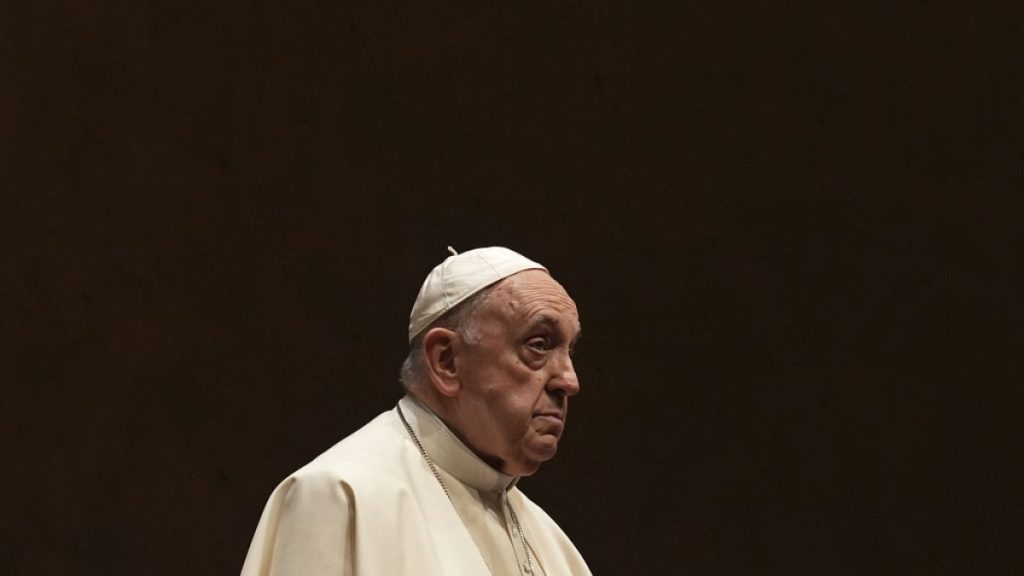Pope Francis, in a virtual meeting bridging continents, engaged with 250 young Ukrainians, offering solace, guidance, and a fervent call for peace amidst the ongoing conflict devastating their nation. This unprecedented dialogue, hailed as the first of its kind between a Pope and Ukrainian youth, unfolded within the hallowed halls of Kyiv’s Cathedral of the Resurrection, with participants joining both physically and virtually from across Europe and North America. The Pope’s message resonated with themes of patriotism, faith, forgiveness, and the crucial role of young people in shaping their nation’s future.
Central to the Pope’s address was the delicate balance between cherishing one’s homeland and embracing forgiveness in the face of profound suffering. He acknowledged the deep wounds inflicted upon Ukraine by the war, yet implored the young participants to love their country fiercely and honor the memory of those who sacrificed their lives to protect it. This call to patriotism was interwoven with a plea to transcend the cycle of hatred and vengeance, emphasizing forgiveness as a pathway towards healing and reconciliation.
The Pope’s message was further amplified by the poignant story of Oleksandr, a young Ukrainian soldier who carried a copy of the Gospels with him into battle and ultimately lost his life. Holding aloft Oleksandr’s rosary, which he now uses in his daily prayers, the Pope presented him as a symbol of faith and sacrifice, a young man who gave his life for the pursuit of peace. This personal touch underscored the human cost of war and resonated deeply with the young audience, connecting their individual experiences to a shared narrative of loss and resilience.
The virtual gathering also provided a platform for the Ukrainian youth to share their own experiences and anxieties directly with the Pope. Julia, a 27-year-old woman, voiced the profound anguish of witnessing the destruction of her cities and the devastating loss of life. She characterized the ongoing conflict as a “genocide” against the Ukrainian people, a stark and emotive term reflecting the immense suffering endured by her nation.
Pope Francis responded with unequivocal condemnation of the war’s devastation, highlighting the ripple effects of conflict, including the specter of famine that often accompanies such widespread destruction. Drawing a parallel to his regular communication with a parish in Gaza, he emphasized the recurring theme of hunger in war-torn regions, underscoring the interconnectedness of global conflicts and their devastating impact on vulnerable populations. The war, he stressed, not only claims lives directly but also inflicts suffering through deprivation and displacement.
This papal address to Ukrainian youth is not an isolated incident in Pope Francis’s ongoing advocacy for peace. He has consistently used significant platforms, including the Vatican Jubilee and Christmas addresses, to appeal for an end to hostilities. His Christmas Day “Urbi et Orbi” blessing specifically called for a ceasefire in Gaza, the release of Israeli hostages, and the initiation of peace talks to resolve the conflict in Ukraine. This consistent messaging underscores the Pope’s commitment to leveraging his influence to promote dialogue, negotiation, and ultimately, a just and lasting peace. The focus on Ukrainian youth, however, marks a targeted effort to empower the next generation to become agents of change and reconciliation in their war-torn nation. He charged them with carrying forward the “spirit of the homeland,” emphasizing their pivotal role in rebuilding and shaping the future of Ukraine. This message of hope and responsibility resonates deeply within a nation grappling with immense challenges, offering a beacon of hope for a future free from conflict. This message aligns with the prevalent religious demographics of Ukraine, where the majority identify as Orthodox Christian, with a significant Catholic minority. By addressing the youth directly, the Pope aims to inspire a generation to embrace the values of peace, forgiveness, and patriotism in the arduous task of rebuilding their nation.














